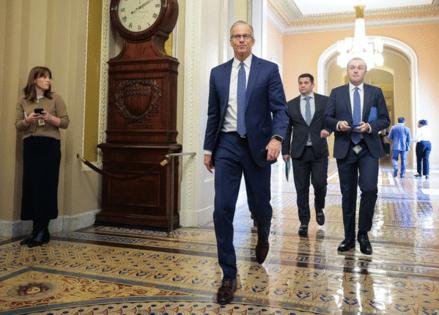Senate to vote on tariff 'emergency' ahead of possible budget vote-a-rama
Published in Political News
WASHINGTON — Senators are expected to take a vote this week designed to stop President Donald Trump’s tariffs on imports from Canada, before the focus turns to Republicans’ effort to advance Trump’s broader policy agenda.
And the House will keep itself occupied with several GOP legislative priorities while waiting to see if the Senate moves forward with a compromise budget resolution this week.
Sen. Tim Kaine, D-Va., is once again using expedited procedures to force a vote on whether or not to terminate a national emergency declaration. This time, it is the declared emergency that Trump used to put 25% tariffs on many Canadian imports, with some exceptions.
“President Trump’s taxes on Canadian goods have sent our economy into chaos, and Americans aren’t buying what he’s selling,” Kaine said in a statement last week. “They know they will pay the price with higher costs for everyday items, and their confidence in the economy is the lowest it has been in recent years.”
But the president appears to be full speed ahead with tariffs affecting Canada and a slew of other countries.
“We have our own energy. We don’t need energy from Canada. We don’t need lumber from Canada. We don’t need anything from Canada,” Trump said Sunday night on Air Force One. “We don’t need cars from Canada, as an example.”
Trump also said Sunday that broad new tariffs kicking in this week would be “more generous” and “kinder” than the treatment U.S. exports have received from other countries.
Congressional Republicans would prefer to focus on other parts of the Trump agenda, including immigration, energy and extending the 2017 tax cuts — the policy proposals that they would like to form the basis of a reconciliation bill. To get there, the House and Senate majorities need to first agree on a budget.
The Senate is expected to try to adopt a compromise budget resolution, which would be offered as an amendment to the earlier resolution adopted by the House. The revised measure would give wide latitude to Senate committees in meeting targets for writing a reconciliation bill that could cover taxes, immigration and energy policy.
Rep. Elise Stefanik, R-N.Y., outlined the prospective next steps on Sunday.
“This is a one-bill approach, and of course, negotiating between the House and Senate is very important. The Senate is working to ensure that the budget passes and comes back to the House,” Stefanik said on the Fox News Channel’s “Sunday Morning Futures” program. “Of course, the House worked very hard, and I supported part of that to unleash this reconciliation package, to deliver the key parts of the president’s agenda.”
The Senate already adopted a budget resolution providing for a two-step process in which tax provisions would be considered separately, but the House GOP and Trump have favored “one big, beautiful bill.”
So, the Senate would need to hold a second vote-a-rama. Senate Majority Leader John Thune, R-S.D., said last week that could come this week, though it may slip to next week.
House floor this week
House leaders want to move forward on a budget resolution before the two-week recess in April, but that timeline very much depends on the Senate.
The headline item on the House floor this week is a Republican bill that would require documentation of U.S. citizenship in order to register to vote in federal elections. The measure has been a priority for the GOP since the start of this Congress.
And the battle over the authority of federal judges to curtail the Trump agenda will also come to the House floor this week, with Republicans seeking to pass a bill that would largely eliminate the ability of federal judges to issue nationwide injunctions.
While the budget work continues, the House is also set to clear for the president’s signature another pair of disapproval measures under the Congressional Review Act.
One would stop a Biden-era Consumer Financial Protection Bureau regulation limiting overdraft fees. The other would stop another regulation, also from the CFPB in the last administration, providing for more power over large nonbank digital payment apps.
©2025 CQ-Roll Call, Inc., All Rights Reserved. Visit cqrollcall.com. Distributed by Tribune Content Agency, LLC.




























































Comments